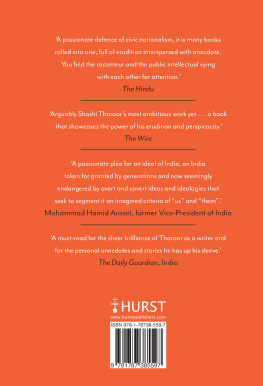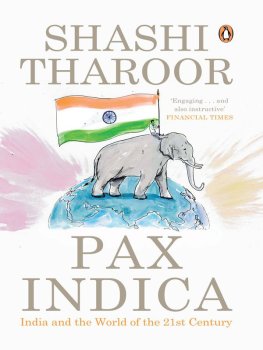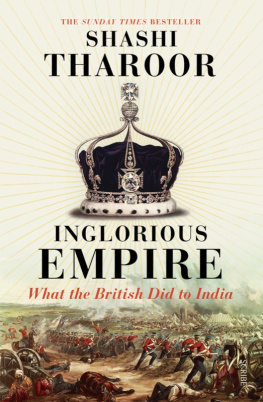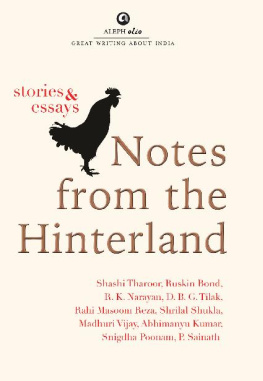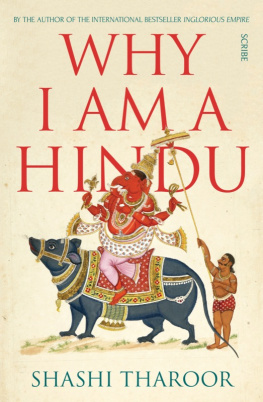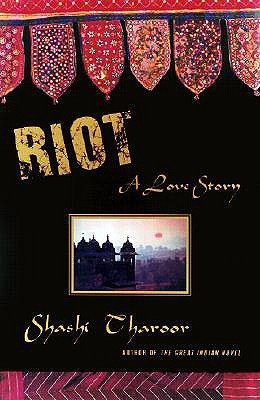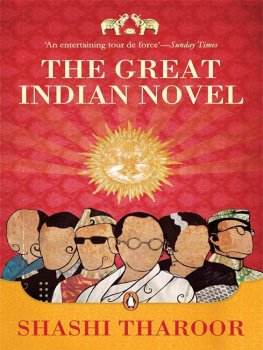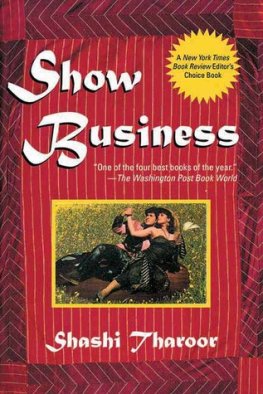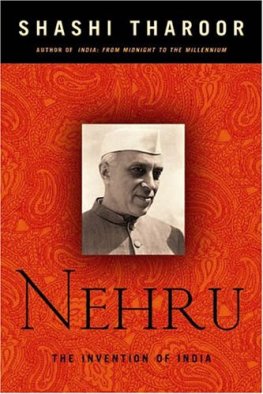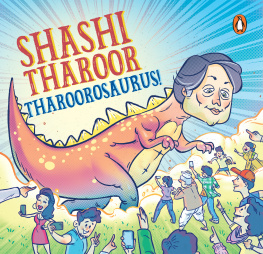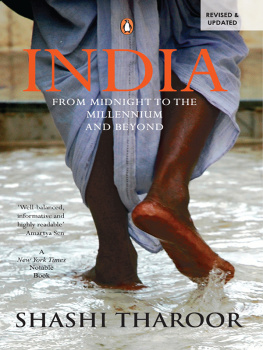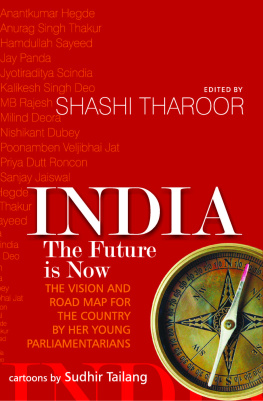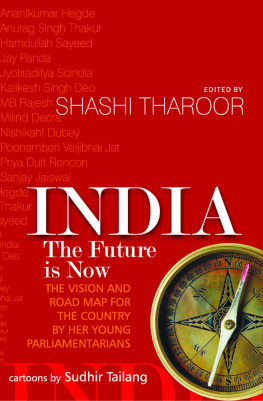Table of Contents

THE STRUGGLE FOR INDIAS SOUL
SHASHI THAROOR
The Struggle for Indias Soul
Nationalism and the Fate of Democracy

HURST & COMPANY, LONDON
ALSO BY SHASHI THAROOR, and published by Hurst
Inglorious Empire: What the British Did to India
Why I Am a Hindu
First published in the United Kingdom in 2021 by
C. Hurst & Co. (Publishers) Ltd.,
83 Torbay Road, London NW6 7DT
Shashi Tharoor, 2021
All rights reserved.
Printed in Scotland
The right of Shashi Tharoor to be identified as the author of this publication is asserted by him in accordance with the Copyright, Designs and Patents Act, 1988.
Distributed in the United States, Canada and Latin America by Oxford University Press, 198 Madison Avenue, New York, NY 10016, United States of America.
A Cataloguing-in-Publication data record for this book is available from the British Library.
ISBN: 9781787385597
This book is printed using paper from registered sustainable and managed sources.
www.hurstpublishers.com
For my sons
Ishaan and Kanishk
who have grappled with issues of nationalism
in their lives and work
CONTENTS
PROLOGUE
A CONGENITAL INDIAN NATIONALIST
The question of nationality and nationhood is not, for me, a purely theoretical issue, the stuff of political philosophy or intellectual argument. It is an intensely personal matter. I was born in London, in 1956, to Indian parents who carried the passports of their newly independent country, just six years after the establishment of the Republic of India. Thanks to the laws prevalent in the United Kingdom, I was eligible from birth for a British passport, an option I have never exercised. The choice remains available: not to make that choice is, therefore, a decision I have consciously taken.
The issue has arisen at various stages of my life. When I won a scholarship to go to graduate school in the United States, at the age of ninteeen, in 1975, I planned to stop in London to visit relatives and friends on the way over. I duly applied for what, in those days, was known as an entry permit, and settled down in the waiting-room of the British deputy high commission in Calcutta (as it then was) for my turn to pay the requisite fee and collect it. Instead, to my surprise and consternation, I was singled out and summoned to the office of the deputy high commissioner. Wondering what I had done to merit this, I nervously entered the dignitarys enormous office, only to be told, Im afraid we cant give you an entry permit.
What have I done wrong? I stuttered. Was there any mistake on my application form?
No, not at all, he said with a smile. You see, your birth certificate means that you are entitled to a British passport.
But I dont want a British passport! I expostulated. I just want an entry permit.
I understand that, said the deputy high commissioner. But you see, we cant give an entry permit to someone who is entitled to a passport. Thats against our rules.
I was stumped by this unexpected development. Are you saying to me that I cant visit London? Unless I take a British passport?
No, Im not saying that, he hastened to assure me. We cant issue you an entry permit, but they cannot deny you entry into London when you have the absolute right to live there. Just go to London and show the immigration officer that you were born there, and they will let you in. They wont even stamp your passport.
I nodded somewhat dubiously at this assurance, but since he refused to accede to my pleas to issue me a permit anyway, went off clutching my Indian passport and hoping for the best. It worked exactly as he had said it would: I landed at London Heathrow and was waved in without any trouble, the immigration officer even helpfully telling me that in future I could use the much shorter lines for British nationals, since, as far as they were concerned, I was one.
This happened a few more times until, in 1979, Margaret Thatcher became prime minister and decided that the entry permit system for Commonwealth citizens was too lax and that we would all require visas. When I checked with the British consulate in Geneva, the city I was based in at the time, I was told there was no provision for exceptions. So, I applied for a visa, paying the extortionate fees the British were charging in order to discourage potential immigration from the Commonwealth.
But the attractions of theatre, cricket, books, and family friendsall of whom were just an eight-hour drive and a Channel-ferry ride away from Genevameant that my wife and I kept going rather often to Britain, and repeated applications for a visa became a rather expensive proposition. I returned to the charge, raising with the friendly British consul in Geneva the paradox of my being eligible for a passport but having to pay through my nose for a visa every time I wanted to set foot in a country in which I was legally entitled to live.
She admitted this was irrational, and a flaw in the rulesbut there was a possible way out. While tightening entry policy, Mrs Thatchers government had also created something called a Certification of the Right of Abode, intended principally for people of British descent, whose parents and grandparents had been born in the colonies, and who would therefore not be eligible under the new law for automatic entry to, or residence in Britain, even though they were plainly of British stock. Though I was not of British stock, she thought perhaps the same certificate on my passport would eliminate my problem.
A couple of head-scratching weeks later, the call came from her office: her proposal had been rejected by London. The problem, she said apologetically, is that under British law, we cannot certify an entitlement that is yours by right.
I threw up my hands at that wonderfully British statement of principle, affirming a status while preventing its practical fulfilment. (I was all too aware that Indians have inherited this wonderful bureaucratic talent too, thanks to British colonialism!) But the consul, a woman of great empathy as well as creativity, was not deterred. In a few days, she asked me to come back to her office. I have a solution for you, she said cheerfully. She stuck the certificate in my passport, pulled out her pen and crossed out the word Certification. Then, in her own hand, she wrote the word Confirmation.
There, she beamed brightly, handing me my passport. I cannot certify your birthright, but theres no rule telling me I cant confirm it. You can use that instead of a visa.
It worked: for a couple of decades afterwards, I was able to breeze in and out past British immigration with the Confirmation of the Right of Abode certificate in my passport, testifying to the fact that I was entitled to more than I was willing to claim. Then computerization and standardization came in, the rules once again had to be applied with no ambiguity, and I was once again required to pay visa rates for a printed certificate (with no handwritten emendation), this time needing to be renewed every five years at an ever-stiffer fee. At one renewal a British consular officer in New York helpfully reminded me that (at that time) it only cost 15 pounds for a passport whereas my certificate cost 65 pounds. I replied: Im happy to pay for the privilege of remaining Indian. I may have been born in Britain, but when I look in the mirror, I see an Indian.
Its difficult to explain this nativism in one who has spent a lifetime acquiring and embodying a cosmopolitan, even globalist, sensibility, so unfashionable today in a world of growing hyper-nationalism. But from a young age, when some of my classmates at school in Bombay teased me about my foreign birth, I have found myself consciously interrogating myself on the question of who I was. My father was an idealist of the generation that had won freedomthough, at not-yet-eighteen when Independence came, he had not personally fought for it, he had supported the nationalist movement, and, heeding Mahatma Gandhis call, had dropped his caste-derived surname. In 1948 he had gone to London straight from his Kerala village, with his elder brothers sponsorship, in much the same spirit as other Keralites starting out in life might have tried their luck in Bombay or Calcutta. Arriving as a student not yet aged nineteen, he had soon begun his working life there, representing Indian newspapers that still maintained offices in the old metropolitan capital. But, after a happy decade in London, he and my mother chose to return to India, because they believed that was where they belonged. Ironically, as India descended into an increasingly corrupt and poorly functioning state, where highly-taxed salaried professionals like himself found it increasingly hard to make ends meet, my father sometimes regretted that decision. But, having come back to India, he imparted to me, his first-born son, a passionate sense of belonging, not just to a physical country called India, but to the idea that it represented in the world.

